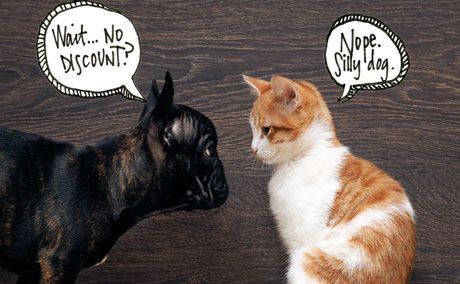I don't give discounts ...
To my veterinary clients. And I don't feel bad about it.

Alright, associates in veterinary practice, let's do a little self-reflection exercise. Answer these questions for me:
> Do you believe there is value in what you do?
> Why do you feel guilty about charging clients appropriately?
> Do you truly believe you are stealing from people?
> Are you suffering from imposter syndrome?
… Or do you simply need to reassess your pricing strategy and make sure it represents an accurate and fair value of your services?
For some veterinarians, discounting is an emotional issue. For some, the reasons we behave the way we do with money are deep-rooted in our subconscious; sometimes we can't access those feelings until someone hits us on the head with it.
So this is me, hitting you on the head.
Discounts: Warm fuzzies for all
Veterinarians have an innate desire to make things right. That desire is reinforced by the need to feel valued by others, to ease their suffering. Warm fuzzies galore. And the easiest path to that feeling is discounting-or worse, giving away-services.
Veterinarians' self-worth
I'm not even going to get into the fact that if clients don't understand the value in what you do-no matter what the charge is-they'll complain about costs or feel unsatisfied. Mark Opperman, CVPM, covers this topic extensively in the first two chapters of the recent second edition of his book The Art of Veterinary Practice Management.
Here's where you can pick up the book.
But what are we really doing here? We're flailing around, ignoring our self-worth and looking for external validation and approval. When clients say they're grateful for a discount, we're happy they're happy.
Sorry to burst your bubble-no amount of external validation is worthwhile unless you honor yourself first and believe your services are valuable.
No Ferrari for that Honda
We can start to change by rewiring our brains. This is called neuroplasticity. To do this, we have to change our beliefs and then our habits. Whether you choose to give discounts and free services regularly or not can play an important role here.
I choose to stick to my guns, charge appropriately and not break down the second a client (or even my boss!) claims a charge is too much. My response is, “Well then, we can work within your budget.” To be fair, my clinic markets itself as a premium clinic with cutting-edge technology, so we don't regularly see low-income clients. But I am certainly not going to give away a Ferrari when all someone can afford is a Honda.
I am most certainly not going to live with the fear that if I charge a pet owner too much that he or she won't come back. My bosses have repeatedly emphasized this when they talk to me about billing and charges because they think I charge too much. Full disclosure: Today I am on strictly production-based pay, and I don't change prices. I simply enter in the services provided as dictated by the price sheet-no more, no less. I don't have the time or energy (nor do I want) to sit and agonize over every transaction with a client. This is precisely why you have predetermined prices, is it not? Rant. Over.
As a young new vet coming into this working world, I still have respect for the way things were done and greatly appreciate what elders have done before me. However, I also have the clarity to see that the way we used to do things is just not sustainable or enjoyable anymore. We are dropping like flies out of the profession. So many of us complain about veterinary practice revenue and how there isn't enough for reasonable pay. (Any of this sound familiar?) And yet we devalue ourselves and our services with discounts.
My advice is, believe in your value and charge appropriately. The struggle is real, but it's worth it.
Hilal Dogan, BVSc, is an associate at Home Animal Hospital in Maui, Hawaii. She started the Veterinary Confessionals Project as a senior veterinary student at Massey University in New Zealand.